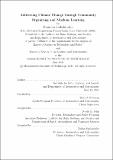Addressing Climate Change through Community Organizing and Machine Learning
Author(s)
Leshchinskiy, Brandon
DownloadThesis PDF (13.67Mb)
Advisor
Newman, Dava J.
Terms of use
Metadata
Show full item recordAbstract
Climate change is the challenge of our time. It is global, slow-moving, and impersonal – yet it has already impacted everyone from California to Kuwait. Humans are ill-adapted to this type of problem, as the scale – both in time and space – is too large to spur action. But to ignore the difficult choices ahead poses a catastrophic threat to humanity. To address the climate crisis – to mobilize societal change – we must make it meaningful to both decision-makers and the public.
In this thesis, I investigate two aims. Aim one is developing EarthDNA Ambassadors, a community that “ripens” the issue of climate change by connecting leaders, empowering students, and engaging the world on climate. Aim two is developing the Earth Intelligence Engine, which uses AI to generate satellite images of the future, bridging the gap between AI experts, climate models, and decision-makers – starting with floods, the most frequent disaster in the US.
I developed and deployed training materials with dozens of young people to address the need for climate leaders. Surveys show the Ambassadors training program not only improves participants’ negotiation and communication skills, but also improves their mindset for learning leadership. Furthermore, EarthDNA’s Climate 101 workshop improves climate literacy and climate behaviors, and although long-lasting change is unlikely after one session, Climate 101 creates a privileged moment in which participants are more likely to increase their involvement in climate activism.
Working with a team, we also developed an initial framework for the Earth Intelligence Engine (EIE) to generate satellite imagery of future floods. The EIE outperforms both our handcrafted baseline and state-of-the-art AI models. We intend to deploy our flood visualization model with the National Oceanic and Atmospheric Administration (NOAA) – integrating flood forecasts with aerial imagery along the entire US East Coast – and then to expand to other areas and events.
Ultimately, climate change requires a mobilization of society at all levels. It demands both technical and adaptive work: new technologies and policies, yes, but also new ways of looking at ourselves and our world. Mitigating our climate crisis hinges on progress in complementary areas: inequity, polarization, and institutional backsliding. Climate change demands that we address many of the world’s most pressing issues – and it will take all of us to succeed.
Date issued
2021-06Department
Massachusetts Institute of Technology. Institute for Data, Systems, and Society; Massachusetts Institute of Technology. Department of Aeronautics and AstronauticsPublisher
Massachusetts Institute of Technology